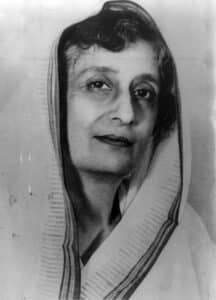

She strongly criticized Ramsay MacDonald’s 1932 communal award which presented separate electorates to several minority communities and oppressed castes.

By the 1930s Kaur had ventured into the Indian freedom struggle.

Kaur developed her inclination to politics during the time she spent with her father, who had close associations with many Congress party veterans such as Gopal Krishna Gokhale. Finally in 1934 she was able to join Gandhi’s Sewagram Ashram, where she remained his secretary for sixteen years. By 1927 she had co-founded the All-India Woman’s Conference, serving as its secretary in 1930 and president in 1933. So, in the initial years after her return, Kaur committed most of her energy to social causes concerning women such as abolishing the practice of purdah, child marriage and the Devadasi tradition.

Though she held a deep will to join his ashram, she was initially denied permission by Gandhi as he felt she was still attached to her material life and that her parents were not too inclined to her joining the Ashram. By 1919, Kaur had begun to grow closer to Gandhi and his teachings. Once she completed her education, Kaur returned to India aged 20. She continued her stay in England, graduating with a remarkable academic and extra-curricular record from the University of Oxford. After an initial period of home-schooling, she was sent to Sherborne School in Dorsetshire, England to complete her school education. In Lucknow, Kaur, the only daughter among 7 children grew up with her siblings on Christian teachings. Her father, Raja Harnam Singh, had converted to Christianity as a young boy and subsequently, kept himself out of the line of successors to the throne. They cannot represent clients whose returns they did not prepare and they cannot represent clients regarding appeals or collection issues even if they did prepare the return in question.Rajkumari Amrit Kaur was born on 2 February 1889 in Lucknow into Punjab’s Kapurthala Royal family. They may only represent clients whose returns they prepared and signed, but only before revenue agents, customer service representatives, and similar IRS employees, including the Taxpayer Advocate Service. Limited Representation Rights: Preparers without credentials as mentioned above have limited practice rights. Tax professionals with these credentials may represent their clients on any matters including audits, payment/collection issues, and appeals. Unlimited Representation Rights: Enrolled agents (EA), certified public accountants (CPA), and attorneys (ATTY) have unlimited representation rights before the IRS. An important difference in the type of tax professionals is “representation rights”.
#Amrit kuar professional#
However, tax professional differ by level of skills, education, and expertise. A tax professional with a IRS Preparer Tax Identification Number (PTIN) is authorized to prepare federal tax returns for you.


 0 kommentar(er)
0 kommentar(er)
